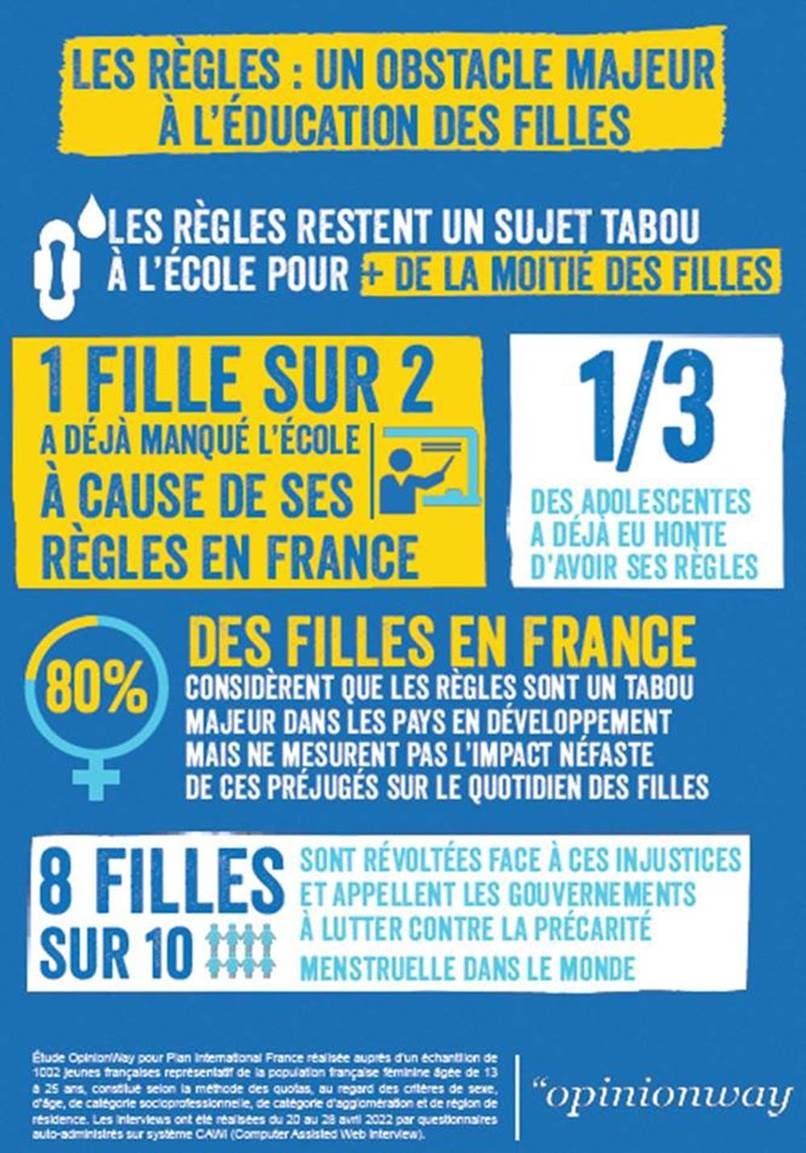Posted 2 days ago,
Reading 2 mins.
On the occasion of World Menstrual Hygiene Day, May 28, 2022, the NGO Plan International France is sounding the alarm in its latest study conducted with OpinionWay on the dramatic impact of periods on the education of young girls. .
The study by Plan International France and OpinionWay was conducted on a sample of 1022 young French women, aged 13 to 25. They responded to an online questionnaire to talk about their relationship to menstruation. Between taboo, shame and stigma related to menstruation, the conclusion is alarming: menstruation is, still in 2022, a major obstacle to the education of girls, in France, and around the world.
A barrier to education
The young women were asked about the taboo nature of menstruation. 59% of them think that periods are still taboo at work compared to 55% for school.
Among the 1022 women questioned, almost all of the women are embarrassed by their periods in the world of work since 87% of them have already felt significant pain at school or at work. 65% of them have already been forced to miss school or work and stay at home because of the pain. 1 out of 2 girls has already missed school because of her periods.
76% have even been uncomfortable because of their periods, whether they were too heavy or too smelly.
Many of them (64%) have already had to leave work or school because they had a bloodstain on their clothes.
47% have ever been ashamed of their periods at school or at work, and 35% of them have already been teased about it.

An international taboo
Among the 1022 women questioned, 65% of them think that periods are taboo in France. They are 78% to affirm that this is the case in the world in general. Still too few people are aware of what the impact of the rules is in some countries, especially developing ones. According to the results of Plan International France, 80% of the French girls questioned consider that periods are a major taboo in developing countries but do not measure the harmful impact of these prejudices on the daily life of young inhabitants.
“In developing countries, the impact of stigma is even stronger: considered ‘impure’, ‘cursed’ or even ‘dangerous’, periods are disturbing. Myths and taboos linked to cultural, religious and patriarchal norms most seriously harm the rights of girls and women”according to the NGO Plan International France.
Menstrual precariousness threatens the schooling of young girls. The lack of access to menstrual products in developing countries prevents girls from going to school. In Uganda, Indonesia or Bangladesh, for example, puberty often marks the complete cessation of schooling. In Nepal, young girls are banished from the home when they have their period. They are forced to isolate themselves in shacks, and therefore cannot go to school. This menstrual exile was banned in 2005 in the Asian country but it continues since 89% of young Nepalese still suffer “a form of exclusion or restriction during their periods”.
“This brutal school drop-out seriously threatens the rights of girls: child marriage, early pregnancy, domestic work and exploitation”according to the NGO.
84% of young girls questioned think that the fate reserved for young women who have settled in developing countries is not discussed enough in France. Among the 1022 participants, 8 out of 10 girls are revolted by these injustices and call on the French government to fight against menstrual poverty in the world.
